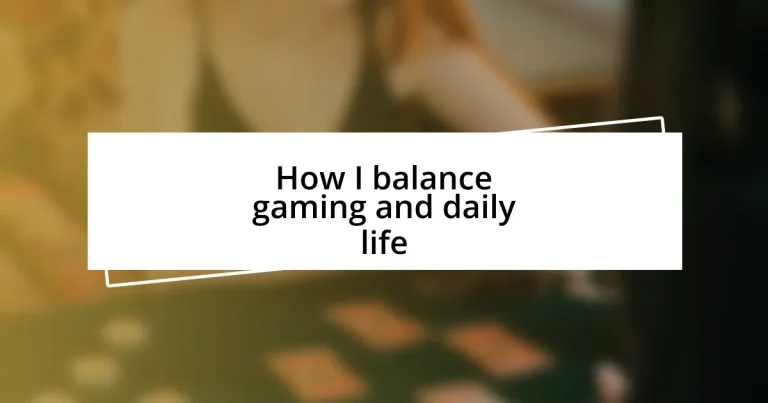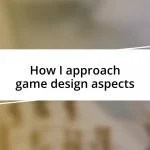Key takeaways:
- Establishing boundaries and setting specific gaming hours helps maintain a healthy balance between gaming and daily responsibilities.
- Creating structured to-do lists and using gaming as a reward for completing real-life tasks enhances motivation and enjoyment of gaming.
- Incorporating self-care, regular breaks, and evaluating progress are key practices for ensuring that gaming complements rather than conflicts with daily life.
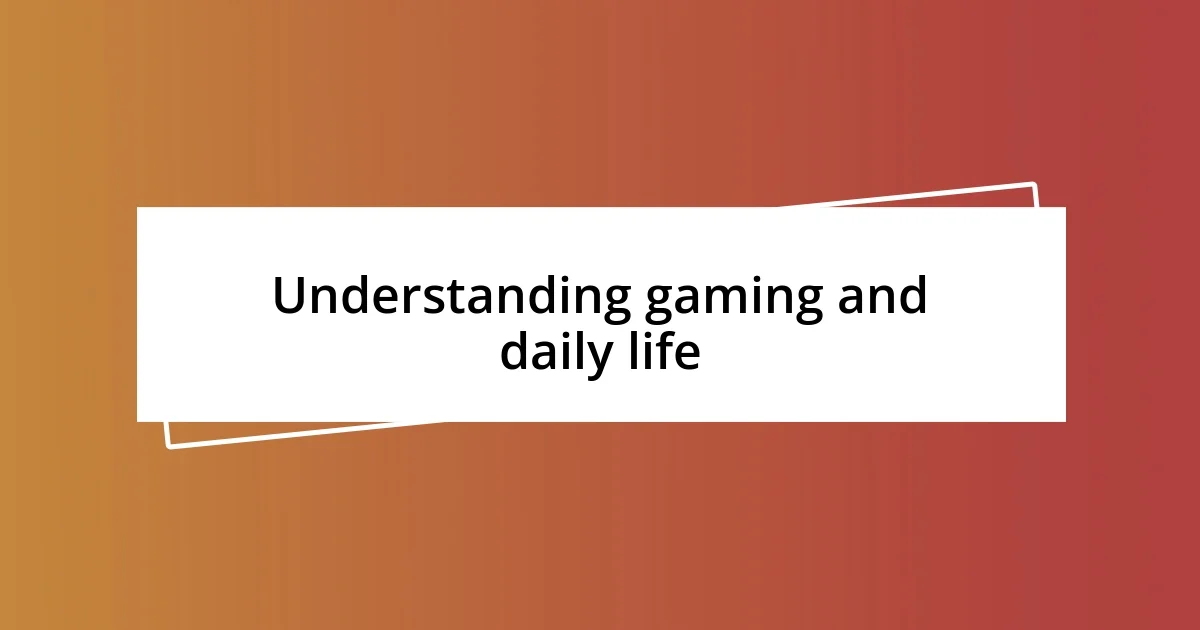
Understanding gaming and daily life
Gaming can be an exhilarating escape from the stresses of everyday life, but it also requires thoughtful consideration when balancing responsibilities. I remember a time when I got so immersed in a compelling storyline that I lost track of time, only to scramble at the last minute to finish my assignments. It’s moments like these that make me wonder: how do we ensure that our passion for gaming doesn’t overshadow our daily commitments?
Daily life can often feel like a monotonous grind, and I frequently find myself seeking refuge in gaming to break the cycle. There’s something undeniably comforting about slipping into another world, where challenges are manageable and achievements are easily attained. However, I’ve learned that setting boundaries helps maintain that healthy balance. When I allocate specific hours for gaming, I can enjoy my time without the nagging weight of unfinished chores or looming deadlines.
Understanding how gaming fits into our overall lifestyle requires self-reflection. I’ve had to ask myself tough questions, like whether my gaming sessions serve as productive relaxation or if they veer into procrastination territory. It’s this constant dialogue with myself that empowers me to recognize the fine line between me time and getting lost in a virtual universe, ultimately helping me cultivate a fulfilling life both in and out of the gaming world.
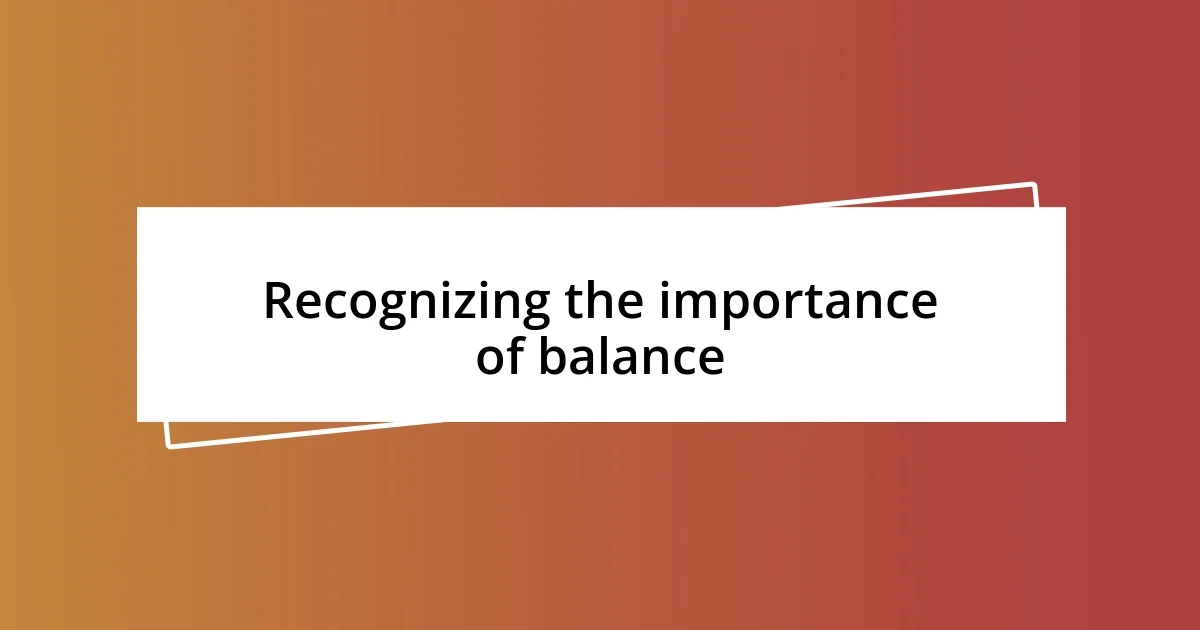
Recognizing the importance of balance
Finding that sweet spot between gaming and daily commitments is crucial. I remember vividly one Sunday when I dove headfirst into an intense multiplayer session. As the hours slipped by, I realized I hadn’t prepped for the upcoming workweek. That morning taught me that balance isn’t just about enjoying my gaming—it’s about ensuring that my real-life responsibilities remain a priority. Without this awareness, gaming can quickly shift from an enjoyable pastime to a source of stress.
Here are a few insights that helped me recognize the importance of balance:
- Prioritize responsibilities: I learned to list daily tasks before logging on. This simple act helps me visualize what needs my attention first.
- Set time limits: Designating specific gaming hours creates structure. It acts as a reliable marker that keeps me accountable.
- Self-checks: I often ask myself how I feel post-gaming. Am I relaxed, or does it feel like I’m avoiding work? Understanding my emotional reaction helps refine my balance.
- Mix activities: Incorporating social activities, like going out with friends or attending events, ensures I don’t get too absorbed in the virtual realm.
- Reflect regularly: I take moments to assess if gaming still brings me joy or if it’s becoming another form of stress management. This reflection can make all the difference.
Being mindful in these areas elevates my gaming experience, enabling me to enjoy my passion without neglecting the aspects of life that truly matter.
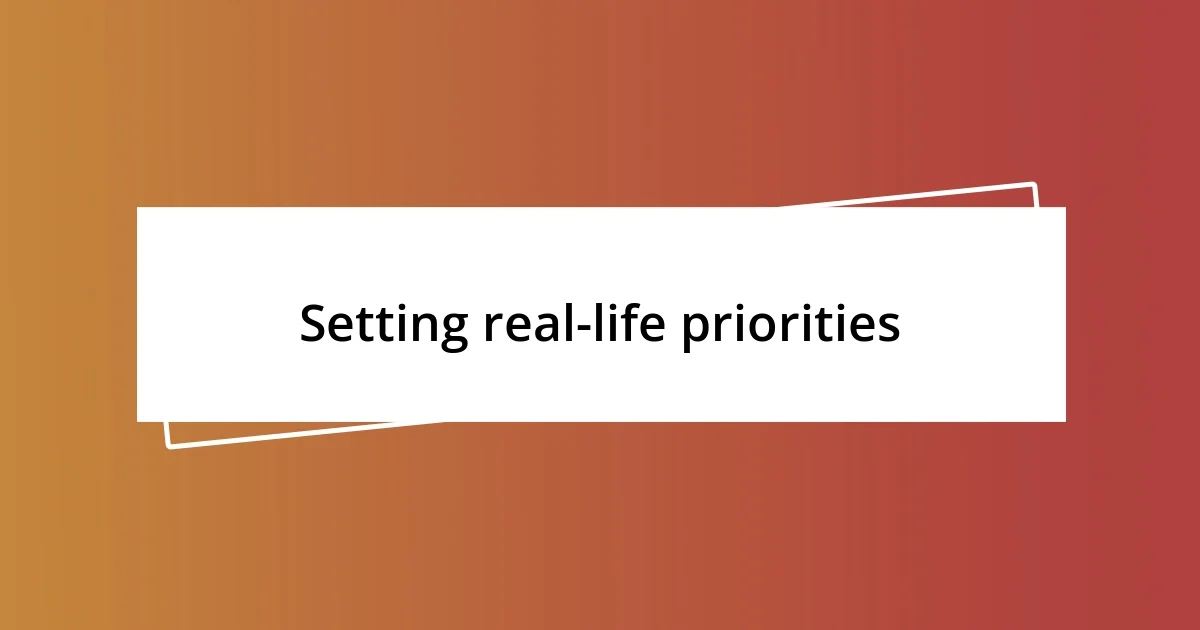
Setting real-life priorities
Setting real-life priorities can feel daunting, especially when gaming pulls you in with such force. I used to struggle with managing my responsibilities, often letting my love for gaming take precedence over essential tasks. One day, as I was flying through a game, I received a reminder that my mom’s birthday was just around the corner. It hit me hard; I hadn’t even planned a gift or celebration. That moment was a wake-up call, and it illustrated the importance of setting priorities that reverberate throughout all aspects of life.
Another insight I’ve gathered in my journey of balancing priorities is to create a structured to-do list that incorporates gaming hours as rewards for completing real-life tasks. When I tackle my chores or responsibilities first, I find that my gaming sessions become much more enjoyable. For instance, if I handle laundry or finish a work project, I reward myself with a few hours of guilt-free gaming afterward. It’s almost like leveling up in life—each completed task opens the door to your next adventure, and the satisfaction of meeting my obligations makes my gaming time feel like an earned reward.
I also believe that communication plays a huge role in maintaining priorities. When I started informing my friends about my gaming schedule, they began to respect it. And this mutual understanding led to fewer interruptions during my gaming sessions. It was such a relief to enjoy playing without constant distractions. Plus, sharing my goals with friends created a network of accountability that helped keep me on track. It’s amazing how aligning your commitments with your gaming passion can enhance not just your gameplay but also the quality of your relationships.
| Real-life Tasks | Gaming Rewards |
|---|---|
| Completing chores | 1 hour of gaming |
| Studying for exams | 2 hours of gaming |
| Running errands | 30 minutes of gaming |
| Attending social events | Weekend gaming session |
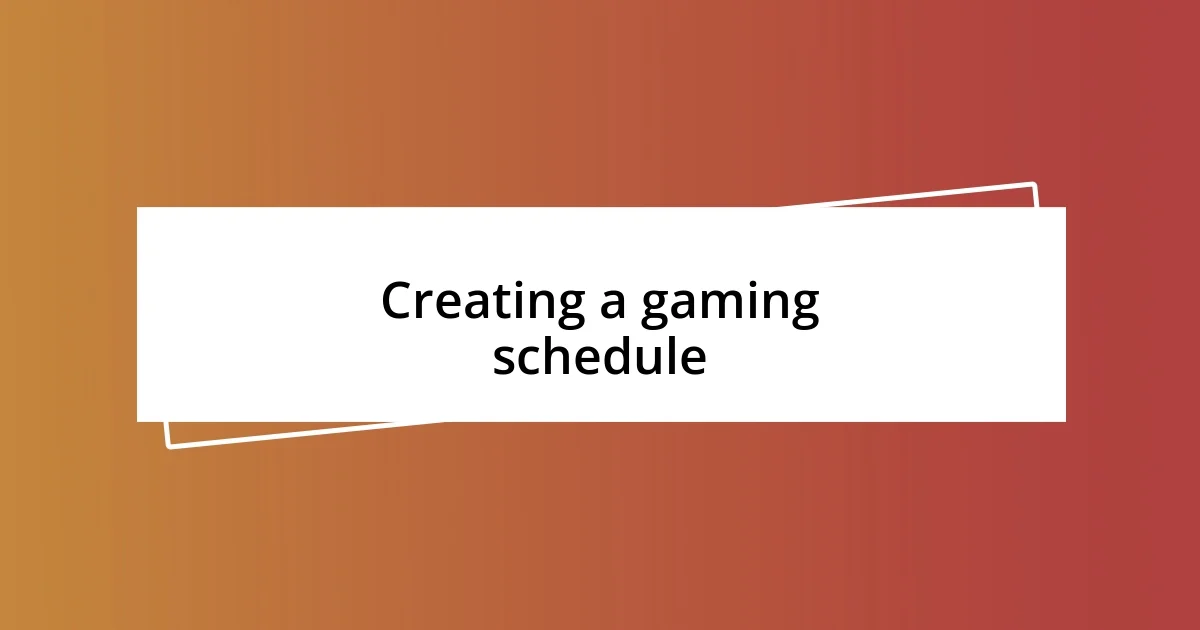
Creating a gaming schedule
Creating a gaming schedule can feel like a balancing act at times. I’ve found that simply mapping out my available hours each week made a significant difference. For example, I dedicate certain evenings specifically for gaming. This strategy not only helps me mentally prepare for immersive sessions but also gives me something to look forward to after a long day.
What really works for me is plotting my gaming hours like a calendar event. I would treat those scheduled blocks as seriously as I would a meeting or a family commitment. Have you ever noticed how much more satisfying gaming feels when you know it’s part of a plan? It does wonders for my focus and motivation, knowing that I’ve earned that time through responsible adulting.
I’ve even experimented with different types of gaming sessions based on my mood and energy levels. For instance, if I’m exhausted from work, I opt for shorter, more casual games. On days when I have more energy, I dive into longer marathon sessions. This approach adds variety and ensures that my gaming remains enjoyable rather than a chore. How do you feel after a long gaming session? I’ve learned that when I respect my energy levels, I not only enhance my enjoyment but also maintain a clearer conscience about my other responsibilities.
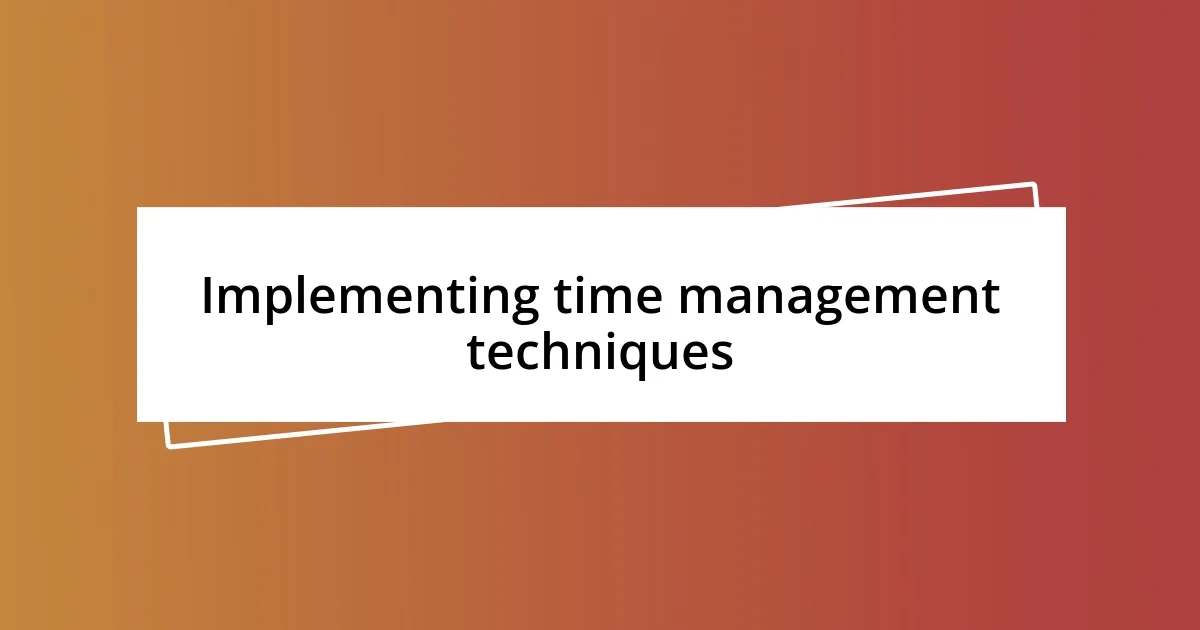
Implementing time management techniques
Implementing time management techniques can revolutionize how you enjoy gaming while fulfilling daily responsibilities. One tool I’ve adopted is the Pomodoro Technique, which has helped me significantly. I set a timer for 25 minutes of focused work followed by a 5-minute break. During those breaks, I sneak in a quick gaming session or watch a gaming video. This way, I stay productive while still being connected to my gaming interests. Have you ever noticed how much more energized you feel after a short break? That quick gaming fix can be just the refresh you need to tackle the next task.
Another effective strategy involves setting specific gaming goals for each week. For instance, I find it beneficial to aim for finishing a game or reaching a certain level by a set date. This approach motivates me to stay on track with my real-life duties since I don’t want to disrupt my gaming plans. Creating these mini-challenges gives my gaming a structured focus that enhances my overall experience. It’s like running a race; the thrill of the finish line keeps me committed. Do you ever find that a little friendly competition with yourself makes achieving your goals feel more rewarding?
Lastly, I believe that visualization plays an important role in balancing gaming and daily life. I often glance at a visual calendar filled with my commitments alongside dedicated gaming times. Seeing everything laid out makes it easier for me to balance obligations without guilt. One day, as I viewed my week, I felt a sense of relief wash over me – I could see my free hours lining up perfectly with my responsibilities. When I visualize my time this way, I feel more in control. Doesn’t it feel good to gain that clarity? It changes how I approach each day, ensuring that my love for gaming complements rather than conflicts with my daily life.
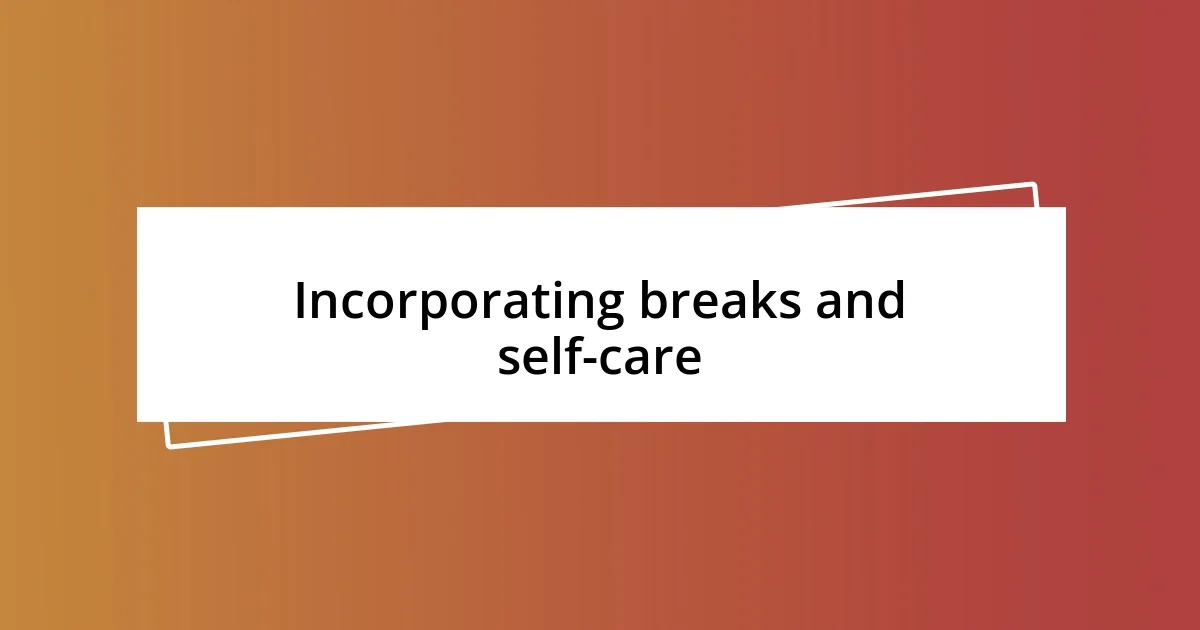
Incorporating breaks and self-care
Taking intentional breaks is crucial for maintaining a healthy balance between gaming and daily life. Whenever I dive into a long session, I make a point to step away for at least 10 to 15 minutes after an hour. During these breaks, I stretch, hydrate, or even do a quick walk around my living room. I’ve found that this little reset not only boosts my focus but also leaves me feeling refreshed and ready to tackle the next quest. Have you ever noticed how a simple break can alter your gaming experience?
Self-care is another vital component in this balancing act. I remember one evening where I felt the urge to keep gaming, but I sensed my body was crying out for some rest. Instead of pushing through, I opted for a warm shower and a cozy book instead. That choice left me feeling rejuvenated, and the next day, I jumped back into my gaming with an enthusiasm I wouldn’t have had otherwise. It taught me the importance of listening to my body. How do you prioritize self-care amidst your gaming adventures?
Sometimes, I even schedule self-care moments along with my gaming blocks. I might plan a longer session with a side of meditation afterward. Introducing those moments allows me to celebrate my in-game achievements while caring for my mental health. Just last week, after a satisfying gaming marathon, I dedicated a few minutes to reflection and gratitude. This practice not only centers me but has also sparked a new appreciation for my gaming experiences. Do you find that blending your passions can enhance both your leisure and well-being?
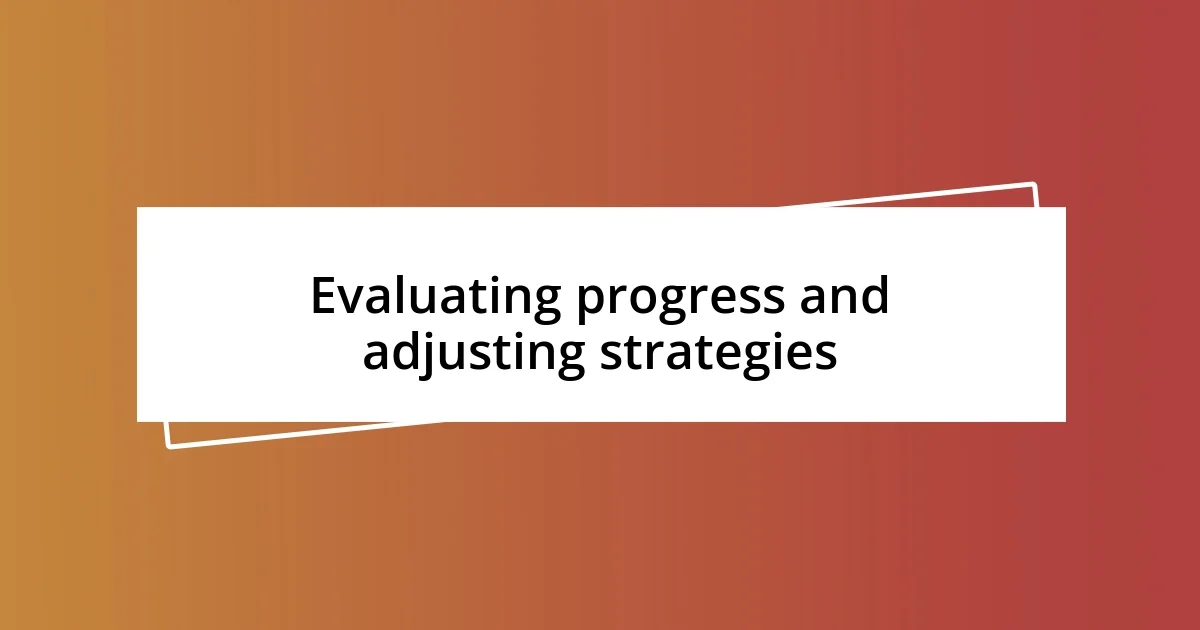
Evaluating progress and adjusting strategies
Evaluating progress in gaming and daily life has become a rewarding practice for me. Recently, I took a moment to reflect on my weekly goals and how well I was balancing my responsibilities. The results surprised me; I realized that some days I barely touched my games, while on others, I played way too long. This prompted me to ask, “Am I truly meeting my goals or just playing for the sake of it?” Self-reflection can be a powerful tool for growth.
Adjusting my strategies is essential. After that reflection, I decided to tweak my gaming schedule. Instead of playing games right after work, I now reserve that time for chores and personal projects first. I found that dedicating time to tasks genuinely energizes me for a rewarding gaming session later. Don’t you think it feels more fulfilling to game after hitting those daily milestones? It transforms the gaming experience into a well-deserved treat rather than a distraction.
In a recent adjustment, I started keeping a gaming journal to track both my achievements and setbacks. Documenting my progress has provided me with insight into patterns I never noticed before. For instance, I found that my most productive gaming sessions often follow a day when I’ve engaged in exercise. This realization led me to incorporate short workouts before gaming, which has not only improved my performance but also made my gaming time feel more purposeful and rewarding. How do you keep track of your progress? It’s a game-changer for achieving balance and satisfaction in both gaming and life.












